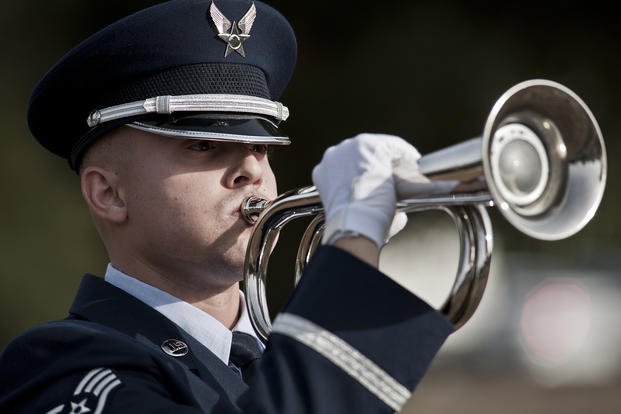You're walking to your car on base when, out of nowhere, music starts blaring. You see service members stop and turn to "face the music." You panic, unsure of what to do, while also silently yelling at your spouse because here is yet another thing he or she didn't tell you about military life.
You glance around, hoping to find another spouse that you can ask or copy. Oh, there's one. He's wrangling his toddler into a car seat and doesn't notice what's going on. Maybe you ignore it? There's another one; she is standing silently. You decide it's better not to move.
What were you supposed to do?
Bugle calls can be confusing, so let's try to make this as easy as possible.
What are the military bugle calls?
Back in the day, military life was dictated by bugle calls. They told service members when to wake up, when to work, when to eat, when to stop work and when to go to bed. There were as many as 25 bugle calls a day and nine on Sundays.
Some bugle calls are no longer relevant, and some installations play more than others. On Army installations, there is a set time for "Reveille'' and "Retreat,'' where on Navy bases, those vary based on sunrise and sunset. The Air Force usually plays the national anthem while some Army installations play a mess call at noon.
Overseas, you may not hear the bugle calls in the housing areas, especially if those neighborhoods are tucked away near cities or local neighborhoods. On bigger bases, you may not hear bugle calls at all when you're in your neighborhood.
What do you do during a bugle call?
Honestly, it depends on which installation and who you are. But according to a 2018 article from Joint Base San Antonio-Lackland, Texas, "Retreat" followed by the anthem or "To the Colors" is played at 5:30 p.m. to signify the end of the workday.
At that point, personnel outside and in uniform are to stop, face the direction of the music and salute during the raising or lowering of the flag. They hold their salute through the entire anthem or "To the Colors."
If in civilian clothes outdoors, service members are expected to stop, face the direction of the music and place their hand over their heart, like when reciting the Pledge of Allegiance. If driving a vehicle, service members should pull over to the side of the road. Requirements for getting out of the vehicle vary by installation and service branch. At JBSA, for example, Army service members are expected to get out of their vehicle, while everyone else can stay inside.
However, JBSA did not state specifically what spouses or other civilians should do -- because military regulations can't dictate their behavior. My advice is to pull over if possible, stand still when outside and not stress over what everyone else is doing.
When we lived on base in Maryland, my children stopped playing and faced the direction of the music, and as soon as it was over, they anxiously peered down the street while waiting for their father to come home. The military is full of traditions, and this is one way they can be incorporated into our daily lives while living on base.
Keep Up with the Ins and Outs of Military Life
For the latest military news and tips on military family benefits and more, subscribe to Military.com and have the information you need delivered directly to your inbox.





























